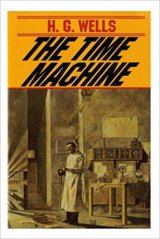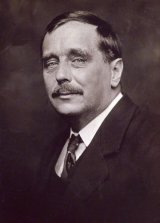The Time Machine Page #5
The Time Machine is a science fiction novella by H. G. Wells, published in 1895 and written as a frame narrative. The work is generally credited with the popularization of the concept of time travel by using a vehicle or device to travel purposely and selectively forward or backward through time.
IV Time Travelling “I told some of you last Thursday of the principles of the Time Machine, and showed you the actual thing itself, incomplete in the workshop. There it is now, a little travel-worn, truly; and one of the ivory bars is cracked, and a brass rail bent; but the rest of it’s sound enough. I expected to finish it on Friday; but on Friday, when the putting together was nearly done, I found that one of the nickel bars was exactly one inch too short, and this I had to get remade; so that the thing was not complete until this morning. It was at ten o’clock today that the first of all Time Machines began its career. I gave it a last tap, tried all the screws again, put one more drop of oil on the quartz rod, and sat myself in the saddle. I suppose a suicide who holds a pistol to his skull feels much the same wonder at what will come next as I felt then. I took the starting lever in one hand and the stopping one in the other, pressed the first, and almost immediately the second. I seemed to reel; I felt a nightmare sensation of falling; and, looking round, I saw the laboratory exactly as before. Had anything happened? For a moment I suspected that my intellect had tricked me. Then I noted the clock. A moment before, as it seemed, it had stood at a minute or so past ten; now it was nearly half-past three! “I drew a breath, set my teeth, gripped the starting lever with both hands, and went off with a thud. The laboratory got hazy and went dark. Mrs. Watchett came in and walked, apparently without seeing me, towards the garden door. I suppose it took her a minute or so to traverse the place, but to me she seemed to shoot across the room like a rocket. I pressed the lever over to its extreme position. The night came like the turning out of a lamp, and in another moment came tomorrow. The laboratory grew faint and hazy, then fainter and ever fainter. Tomorrow night came black, then day again, night again, day again, faster and faster still. An eddying murmur filled my ears, and a strange, dumb confusedness descended on my mind. “I am afraid I cannot convey the peculiar sensations of time travelling. They are excessively unpleasant. There is a feeling exactly like that one has upon a switchback—of a helpless headlong motion! I felt the same horrible anticipation, too, of an imminent smash. As I put on pace, night followed day like the flapping of a black wing. The dim suggestion of the laboratory seemed presently to fall away from me, and I saw the sun hopping swiftly across the sky, leaping it every minute, and every minute marking a day. I supposed the laboratory had been destroyed and I had come into the open air. I had a dim impression of scaffolding, but I was already going too fast to be conscious of any moving things. The slowest snail that ever crawled dashed by too fast for me. The twinkling succession of darkness and light was excessively painful to the eye. Then, in the intermittent darknesses, I saw the moon spinning swiftly through her quarters from new to full, and had a faint glimpse of the circling stars. Presently, as I went on, still gaining velocity, the palpitation of night and day merged into one continuous greyness; the sky took on a wonderful deepness of blue, a splendid luminous colour like that of early twilight; the jerking sun became a streak of fire, a brilliant arch, in space; the moon a fainter fluctuating band; and I could see nothing of the stars, save now and then a brighter circle flickering in the blue. “The landscape was misty and vague. I was still on the hillside upon which this house now stands, and the shoulder rose above me grey and dim. I saw trees growing and changing like puffs of vapour, now brown, now green; they grew, spread, shivered, and passed away. I saw huge buildings rise up faint and fair, and pass like dreams. The whole surface of the earth seemed changed—melting and flowing under my eyes. The little hands upon the dials that registered my speed raced round faster and faster. Presently I noted that the sun belt swayed up and down, from solstice to solstice, in a minute or less, and that consequently my pace was over a year a minute; and minute by minute the white snow flashed across the world, and vanished, and was followed by the bright, brief green of spring. “The unpleasant sensations of the start were less poignant now. They merged at last into a kind of hysterical exhilaration. I remarked, indeed, a clumsy swaying of the machine, for which I was unable to account. But my mind was too confused to attend to it, so with a kind of madness growing upon me, I flung myself into futurity. At first I scarce thought of stopping, scarce thought of anything but these new sensations. But presently a fresh series of impressions grew up in my mind—a certain curiosity and therewith a certain dread—until at last they took complete possession of me. What strange developments of humanity, what wonderful advances upon our rudimentary civilisation, I thought, might not appear when I came to look nearly into the dim elusive world that raced and fluctuated before my eyes! I saw great and splendid architecture rising about me, more massive than any buildings of our own time, and yet, as it seemed, built of glimmer and mist. I saw a richer green flow up the hillside, and remain there, without any wintry intermission. Even through the veil of my confusion the earth seemed very fair. And so my mind came round to the business of stopping. “The peculiar risk lay in the possibility of my finding some substance in the space which I, or the machine, occupied. So long as I travelled at a high velocity through time, this scarcely mattered: I was, so to speak, attenuated—was slipping like a vapour through the interstices of intervening substances! But to come to a stop involved the jamming of myself, molecule by molecule, into whatever lay in my way; meant bringing my atoms into such intimate contact with those of the obstacle that a profound chemical reaction—possibly a far-reaching explosion—would result, and blow myself and my apparatus out of all possible dimensions—into the Unknown. This possibility had occurred to me again and again while I was making the machine; but then I had cheerfully accepted it as an unavoidable risk—one of the risks a man has got to take! Now the risk was inevitable, I no longer saw it in the same cheerful light. The fact is that, insensibly, the absolute strangeness of everything, the sickly jarring and swaying of the machine, above all, the feeling of prolonged falling, had absolutely upset my nerves. I told myself that I could never stop, and with a gust of petulance I resolved to stop forthwith. Like an impatient fool, I lugged over the lever, and incontinently the thing went reeling over, and I was flung headlong through the air.
Translation
Translate and read this book in other languages:
Select another language:
- - Select -
- 简体中文 (Chinese - Simplified)
- 繁體中文 (Chinese - Traditional)
- Español (Spanish)
- Esperanto (Esperanto)
- 日本語 (Japanese)
- Português (Portuguese)
- Deutsch (German)
- العربية (Arabic)
- Français (French)
- Русский (Russian)
- ಕನ್ನಡ (Kannada)
- 한국어 (Korean)
- עברית (Hebrew)
- Gaeilge (Irish)
- Українська (Ukrainian)
- اردو (Urdu)
- Magyar (Hungarian)
- मानक हिन्दी (Hindi)
- Indonesia (Indonesian)
- Italiano (Italian)
- தமிழ் (Tamil)
- Türkçe (Turkish)
- తెలుగు (Telugu)
- ภาษาไทย (Thai)
- Tiếng Việt (Vietnamese)
- Čeština (Czech)
- Polski (Polish)
- Bahasa Indonesia (Indonesian)
- Românește (Romanian)
- Nederlands (Dutch)
- Ελληνικά (Greek)
- Latinum (Latin)
- Svenska (Swedish)
- Dansk (Danish)
- Suomi (Finnish)
- فارسی (Persian)
- ייִדיש (Yiddish)
- հայերեն (Armenian)
- Norsk (Norwegian)
- English (English)
Citation
Use the citation below to add this book to your bibliography:
Style:MLAChicagoAPA
"The Time Machine Books." Literature.com. STANDS4 LLC, 2025. Web. 21 Jan. 2025. <https://www.literature.com/book/the_time_machine_159>.




Discuss this The Time Machine book with the community:
Report Comment
We're doing our best to make sure our content is useful, accurate and safe.
If by any chance you spot an inappropriate comment while navigating through our website please use this form to let us know, and we'll take care of it shortly.
Attachment
You need to be logged in to favorite.
Log In